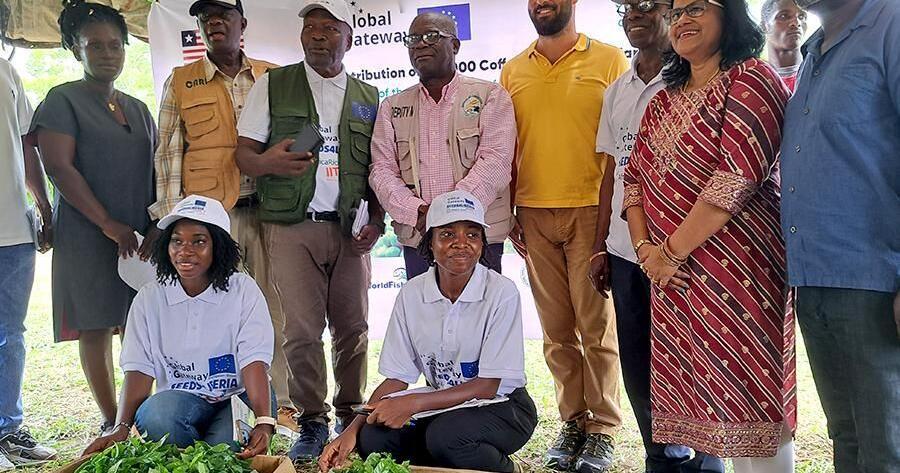Africa-Press – Liberia. The International Institute of Tropical Agriculture (IITA), through the Seeds4Liberia Project, recently distributed thousands of coffee seedlings to farmers from Bong, Lofa, Montserrado, and Nimba counties as part of efforts to revamp Liberia’s coffee sector, promote crop diversification in the agriculture sector, and improve farmers’ income.
The exercise followed the collection of coffee beans from selected farmers’ fields across three coffee species (robusta, liberica and arabica) from five coffee-producing counties (Bong, Bomi, Nimba, Lofa, and Montserrado) for the purpose of multiplication, distribution and further research, such as DNA fingerprinting and bean quality analysis including estimation of caffeine content and aromatic profiles.
A total of 267,000 seedlings from arabica, liberica, and robusta species were distributed, with oversight from IITA, the Ministry of Agriculture (MoA), Central Agricultural Research Institute (CARI), Farmers’ Union Network of Liberia (FUNL), Seeds Development and Certification Agency (SDCA), and the European Union (EU) Delegation to Liberia.
Key figures, including Solomon C. Hedd-Williams, Deputy Minister for Technical Services at the Ministry of Agriculture, Mr. Antonio Di Clemente from the EU Delegation, and Hon. Josephine Francis of the Farmers Union Network, emphasized the significance of this initiative in establishing a resilient coffee seed system in Liberia.
The project’s National Coordinator, AfricaRice’s Country Representative to Liberia Dr. Inoussa Akintayo, highlighted the outcomes of the EU-funded Seeds4Liberia Project, part of the broader “From Productivity to Product” (P2P) initiative. At the same time, the team lead of the coffee component, Dr. Ranjana Bhattacharjee, provided an overview of the roadmap for putting Liberia’s coffee on the world market.
Madam Josephine Francis, President of Farmers Union Network of Liberia, emphasized the coffee sector’s potential to alleviate poverty and create jobs: “Coffee is the second global commodity, next to petroleum. It is a trillion-dollar industry. This sector has enormous potential to alleviate poverty, as our young population can take up many jobs along the coffee value chain. Let us all work together to make this a reality, and it starts today with the Seeds4Liberia initiative.”
Key stakeholders, including the Farmers Union Network of Liberia, farmer cooperatives, farmer groups, the Ministry of Agriculture, the Central Agricultural Research Institute (CARI), and the Seeds Development and Certification Agency (SDCA), along with scientists and researchers, gathered at CARI to witness the event.
The event concluded with stakeholders committing to scaling up production, accelerating data collection on the coffee sector, variety registration, and intensifying farmer training. As Liberia aims for a resilient and self-reliant coffee sector, the Seeds4Liberia initiative is a model of impactful collaboration among research, policy, and grassroots engagement.
About the Seeds4Liberia Project
Launched late in 2024, the EU-funded project is poised to bring relief to the value chains of rice, cassava, coffee, soybeans, and fish, which undoubtedly have huge potential but face numerous challenges, ranging from human capacity development to the absence of improved seed varieties.
The project aims to address the priorities of these sectors, including strengthening the capacity of farmers, private seed enterprises, and government ministries and agencies. Furthermore, it is collaborating with similar interventions to enhance quality assurance, increase varietal turnover, and boost yields, while also transferring cutting-edge knowledge and skills.
The project is expected to cultivate approximately 4200 hectares to produce seeds for rice, cassava, soybeans, coffee, and fish. Additionally, it promises to deliver 3,000 tons of certified rice seeds, 62,500 bundles of cassava, 4,800 tons of soybeans, 1,100,000 coffee seeds, and 45 million fish fingerlings throughout its lifespan.
AfricaRice, the International Institute of Tropical Agriculture (IITA), and WorldFish are collaborating on the project with the Ministry of Agriculture (MoA), the Central Agricultural Research Institute (CARI), the Seeds Development and Certification Agency (SDCA), the National Fisheries and Aquaculture Authority (NaFAA), and the Liberia Agriculture Commodity Regulatory Authority (LACRA).
For More News And Analysis About Liberia Follow Africa-Press






